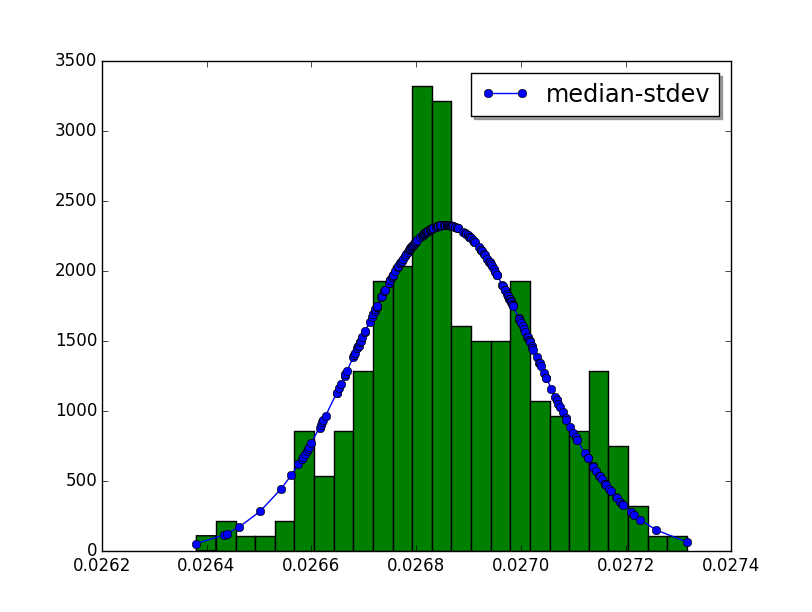Examples¶
bench_func() method¶
Benchmark using the Runner.bench_func() method to
measure the time elapsed when sleeping 1 ms:
#!/usr/bin/env python3
import pyperf
import time
def func():
time.sleep(0.001)
runner = pyperf.Runner()
runner.bench_func('sleep', func)
time.sleep() is used to simulate a real workload taking at least 1 ms.
bench_async_func() method¶
#!/usr/bin/env python3
import asyncio
import pyperf
async def func():
await asyncio.sleep(0.001)
runner = pyperf.Runner()
runner.bench_async_func('async_sleep', func)
asyncio.sleep() is used to simulate a real workload taking at least 1 ms.
timeit() method¶
Benchmark using the Runner.timeit() method to measure the performance of
sorting a sorted list of 1000 numbers using a key function (which does
nothing):
#!/usr/bin/env python3
import pyperf
runner = pyperf.Runner()
runner.timeit("sorted(list(range(1000)), key=lambda x: x)",
stmt="sorted(s, key=f)",
setup="f = lambda x: x; s = list(range(1000))")
bench_command() method¶
Benchmark using the Runner.bench_command() method to measure the time to
run the python -c pass command:
#!/usr/bin/env python3
import sys
import pyperf
runner = pyperf.Runner()
runner.bench_command('python_startup', [sys.executable, '-c', 'pass'])
bench_time_func() method¶
Microbenchmark using the Runner.bench_time_func()
method to measure the performance of dict[key]:
#!/usr/bin/env python3
import pyperf
def bench_dict(loops, mydict):
range_it = range(loops)
t0 = pyperf.perf_counter()
for _ in range_it:
mydict['0']
mydict['100']
mydict['200']
mydict['300']
mydict['400']
mydict['500']
mydict['600']
mydict['700']
mydict['800']
mydict['900']
return pyperf.perf_counter() - t0
runner = pyperf.Runner()
mydict = {str(k): k for k in range(1000)}
# inner-loops: dict[str] is duplicated 10 times
runner.bench_time_func('dict[str]', bench_dict, mydict, inner_loops=10)
Pass --help to the script to see the command line options automatically
added by pyperf.
The mydict[key] instruction is repeated 10 times to reduce the cost of the
outer range(loops) loop. To adjust the final result,
runner.inner_loops is set to 10, the number of times that
mydict[key] is repeated.
The repetition is needed on such microbenchmark where the measured instruction takes less than 1 microsecond. In this case, the cost the outer loop is non negligible.
hist_scipy script¶
Example to render an histogram in graphical mode using the scipy module:
#!/usr/bin/env python3
import argparse
import matplotlib.pyplot as plt
import pyperf
import pylab
import scipy.stats as stats
def display_histogram_scipy(bench, mean, bins):
values = bench.get_values()
values = sorted(values)
if mean:
fit = stats.norm.pdf(values, bench.mean(), bench.stdev())
pylab.plot(values, fit, '-o', label='mean-stdev')
else:
fit = stats.norm.pdf(values, bench.mean(), bench.stdev())
pylab.plot(values, fit, '-o', label='mean-stdev')
plt.legend(loc='upper right', shadow=True, fontsize='x-large')
pylab.hist(values, bins=bins)
pylab.show()
def main():
parser = argparse.ArgumentParser()
parser.add_argument('-n', '--bins', type=int, default=25,
help="Number of histogram bars (default: 25)")
parser.add_argument('--mean', action="store_true",
help="Use mean-stdev, instead of median-mad")
parser.add_argument('-b', '--benchmark')
parser.add_argument('filename')
args = parser.parse_args()
if args.benchmark:
suite = pyperf.BenchmarkSuite.load(args.filename)
bench = suite.get_benchmark(args.benchmark)
else:
bench = pyperf.Benchmark.load(args.filename)
display_histogram_scipy(bench, args.mean, args.bins)
if __name__ == "__main__":
main()
Usage:
python3 hist_scipy.py [-n BINS/--bins=BINS] filename.json
--binsis the number of histogram bars (default: 25)
This command requires the scipy dependency.
Example:
$ python3 hist_scipy telco.json
Output:

plot¶
Script using matplotlib to plot values:
#!/usr/bin/env python3
import argparse
import matplotlib.pyplot as plt
import pyperf
import statistics
def plot_bench(args, bench):
if not args.split_runs:
runs = bench.get_runs()
if args.run:
run = runs[args.run - 1]
runs = [run]
values = []
for run in runs:
run_values = run.values
if args.skip:
run_values = run_values[args.skip:]
values.extend(run_values)
plt.plot(values, label='values')
mean = statistics.mean(values)
plt.plot([mean] * len(values), label='mean')
else:
values = []
width = None
for run_index, run in enumerate(bench.get_runs()):
index = 0
x = []
y = []
run_values = run.values
if args.skip:
run_values = run_values[args.skip:]
for value in run_values:
x.append(index)
y.append(value)
index += 1
plt.plot(x, y, color='blue')
values.extend(run_values)
width = len(run_values)
if args.warmups:
run_values = [value for loops, value in run.warmups]
index = -len(run.warmups) + 1
x = []
y = []
for value in run_values:
x.append(index)
y.append(value)
index += 1
plt.plot(x, y, color='red')
mean = statistics.mean(values)
plt.plot([mean] * width, label='mean', color='green')
plt.legend(loc='upper right', shadow=True, fontsize='x-large')
plt.show()
def parse_args():
parser = argparse.ArgumentParser()
parser.add_argument('-b', '--benchmark')
parser.add_argument('--split-runs', action='store_true')
parser.add_argument('--skip', type=int, help='skip first SKIP values')
parser.add_argument('--warmups', action='store_true')
parser.add_argument('--run', metavar='INDEX', type=int,
help='only render run number INDEX')
parser.add_argument('filename')
return parser.parse_args()
def main():
args = parse_args()
if args.benchmark:
suite = pyperf.BenchmarkSuite.load(args.filename)
bench = suite.get_benchmark(args.benchmark)
else:
bench = pyperf.Benchmark.load(args.filename)
plot_bench(args, bench)
if __name__ == "__main__":
main()
Usage:
$ python3 plot.py telco.json
$ python3 plot.py -b telco suite.json # only render telco benchmark
export_csv¶
Script exporting the average of run values as CSV:
#!/usr/bin/env python3
import argparse
import csv
import pyperf
import statistics
def export_csv(args, bench):
runs = bench.get_runs()
runs_values = [run.values for run in runs if run.values]
rows = []
for run_values in zip(*runs_values):
mean = statistics.mean(run_values)
rows.append([mean])
with open(args.csv_filename, 'w', newline='', encoding='ascii') as fp:
writer = csv.writer(fp)
writer.writerows(rows)
def parse_args():
parser = argparse.ArgumentParser()
parser.add_argument('-b', '--benchmark')
parser.add_argument('json_filename')
parser.add_argument('csv_filename')
return parser.parse_args()
def main():
args = parse_args()
if args.benchmark:
suite = pyperf.BenchmarkSuite.load(args.json_filename)
bench = suite.get_benchmark(args.benchmark)
else:
bench = pyperf.Benchmark.load(args.json_filename)
export_csv(args, bench)
if __name__ == "__main__":
main()
Usage:
$ python3 plot.py telco.json telco.csv
$ python3 plot.py result.json -b telco telco.csv